The application of gene therapy, a procedure that can modify a person’s genes to help treat diseases, expands beyond medical treatments and is used to boost longevity and well-being. This method has made the news recently thanks to Bryan Johnson, a centimillionaire known for his zealous attempts to slow down aging. He underwent gene therapy at the beginning of 2024 and documented his experience.
If you’re curious about Bryan Johnson’s gene therapy, we’ll present the procedure, its effectiveness, and potential side effects, breaking down the available information and giving you a realistic assessment of the treatment and its perceived benefits.
The basics of Bryan Johnson’s follistatin gene therapy
Bryan Johnson opted for follistatin gene therapy. As the procedure isn’t available in the U.S., Johnson had to travel to Prospera, a private, self-governing experimental zone and startup hub on Honduras’ Roatan island, to access it.
The therapy currently costs $25,000 and is available only in the GARM Clinic on Roatan and the Eterna Health Clinic in Dubai.
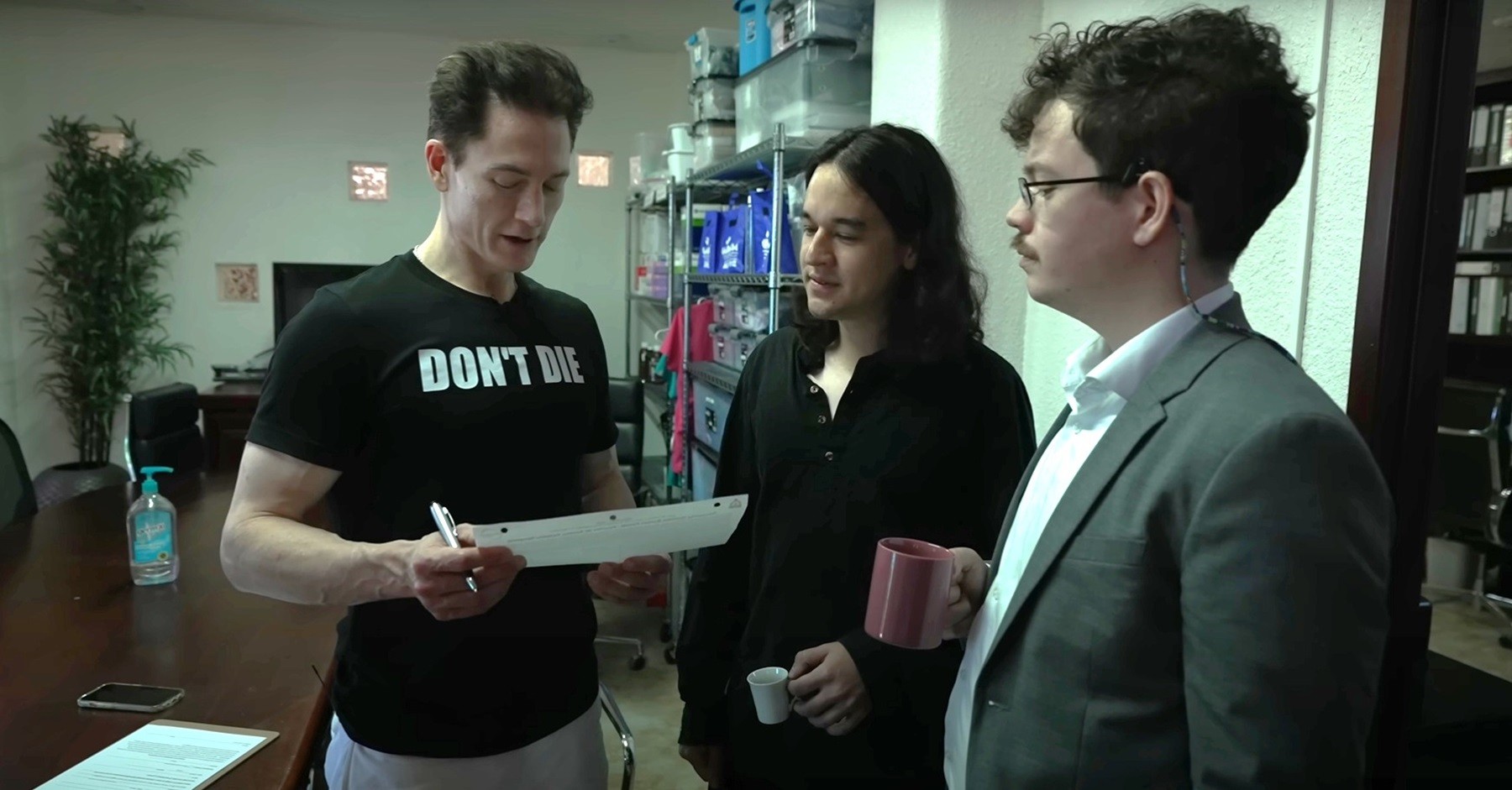
Source: Bryan Johnson’ via YouTube
Minicircle, the company that produced and delivered Bryan’s therapy, is one of the pioneers in human genetic enhancement. Although it has only completed a Phase I clinical trial on follistatin gene therapy, Minicircle claims that the treatment has shown great promise, ranking among top lifespan studies.
Bonus read: Learn more about Bryan Johnson’s endeavors to reverse aging in our other article about his books and recommended reading.
How follistatin gene therapy works
Minicircle’s follistatin gene therapy involves the injection of follistatin, a protein your body naturally produces, into your stomach fat. Follistatin inhibits the activity of myostatin, another protein that limits muscle development to prevent overgrowth.
According to Minicircle, follistatin gene therapy might be able to:
Increase muscle mass and strength
Delay the onset of aging
Reduce the epigenetic clock age
The company also claims that the treatment may be able to elongate telomeres (chromosome ends), which in turn promotes longevity and mitigates the risk of age-associated diseases like:
Cancer
Heart disease
Neurodegenerative conditions
To deliver follistatin, Minicircle uses plasmids, small circular DNA molecules independent of your chromosomal DNA and don’t edit or integrate into it. Plasmids can be regulated with activator pills, which ensures treatment reversibility and adds to its safety. Its effects can be eliminated instantly with an antibiotic in case of adverse reactions.
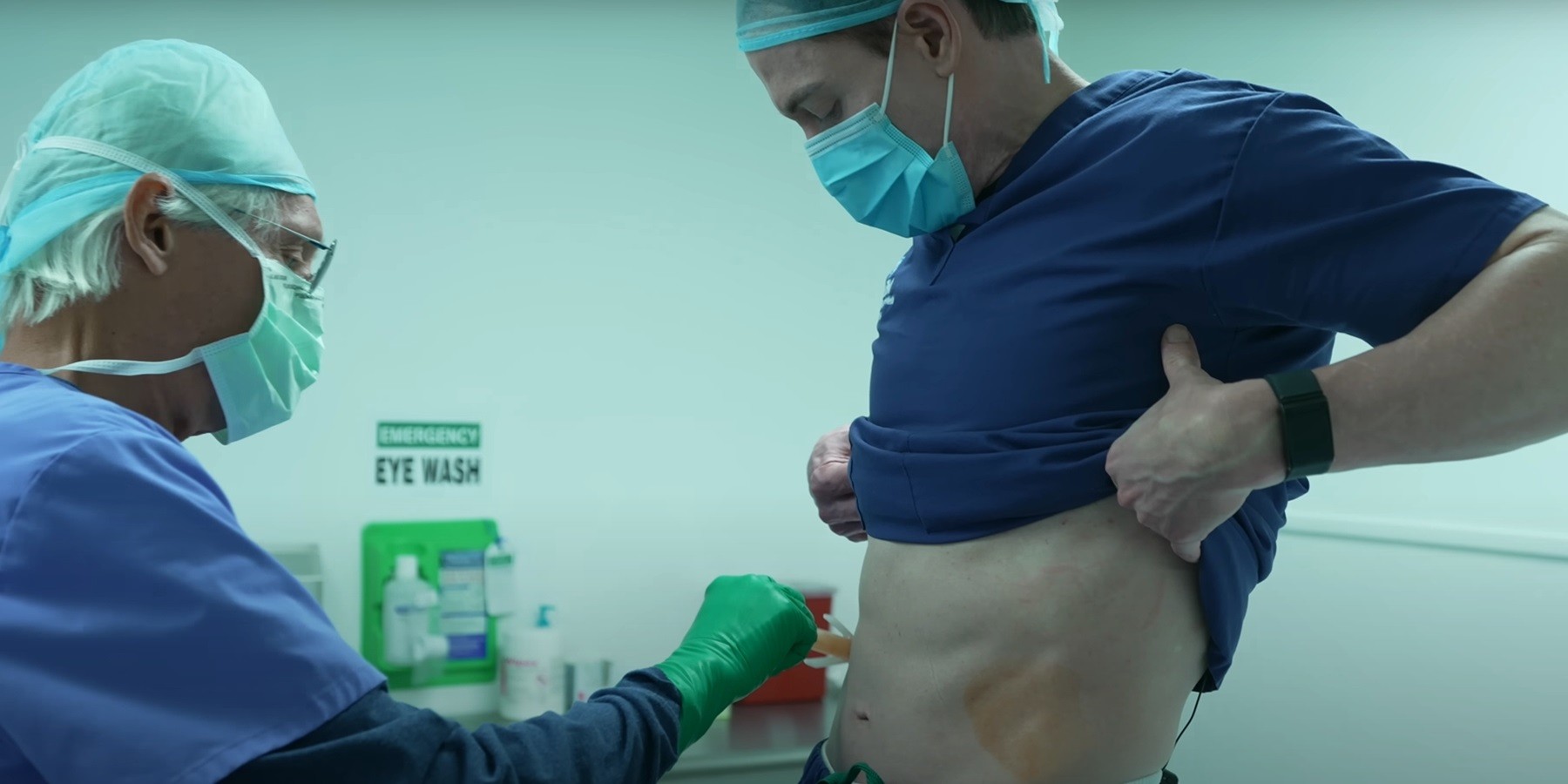
Source: Bryan Johnson via YouTube
Is follistatin gene therapy backed by science?
There’s not enough scientific evidence to confirm the safety and efficacy of follistatin gene therapy for longevity purposes. Most of the research has been conducted on animals, with one 2022 study demonstrating that the therapy has extended the median lifespan of mice by 32.5% and increased their muscle mass two-fold without increasing the risk of cancer.
We can’t generalize these findings to people, though. In research on humans, follistatin gene therapy has shown potential to be a safe and effective form of treatment for muscle diseases like Becker muscular dystrophy, but its anti-aging properties haven’t been validated.
The U.S. Food and Drug Administration (FDA) has yet to approve follistatin gene therapy, which is why Bryan Johnson had to get it in Prospera. We need more research on human subjects to determine its life-extending properties and rule out long-term side effects.
Bryan Johnson’s results after gene therapy
As part of his Project Blueprint, Bryan monitors his biomarkers regularly to assess his progress and the effectiveness of individual treatments and products. He reported the following results after completing gene therapy:
Keep in mind that Bryan subjects himself to a wide range of treatments and maintains a generally healthy lifestyle through:
Because of Bryan’s comprehensive approach, these improvements can’t be attributed solely to gene therapy.
Bonus read: Learn about about Bryan’s other anti-aging efforts:
What is the future of genetics and gene therapy?
Gene therapy is rapidly evolving and finding its application in various areas of medicine, including the treatment of rare diseases. According to Nature, over 2,000 gene therapies are currently being developed. Also, researchers at the University of Massachusetts predict that the FDA will approve over 60 gene therapies by 2030.
One of the latest developments in gene therapy is CRISPR, a technology that allows scientists to edit patients’ genomes, fix defects, and help treat different conditions.
Casgevy, a new CRISPR-based therapy for sickle cell anemia, one of the most common inheritable conditions in the world, can be revolutionary for patients. The treatment has emerged as a much more convenient and less invasive option than bone marrow transplants, which were the only available cure until recently.
While these therapies are impressive and promising, most people still can’t access them because they are extremely expensive. Some treatments even had to be withdrawn because of their low commercial potential and exorbitant prices, often reaching millions. The truth is that people in developing countries, who typically need gene therapies the most, are least likely to benefit from them.
The democratization of genetic knowledge
Gene therapy may still be out of reach for most people, but genetic testing is the most accessible it’s ever been. While it required a doctor’s visit and thousands of dollars before, companies such as Ancestry and 23andMe now allow customers to buy tests for less than $100 and take them without leaving their homes.
This shift has enabled a large number of people to learn about their genetic composition and even get basic insights into potential health risks. Still, while these direct-to-consumer tests are suitable for ancestry analysis and relative matching, they can’t offer complete and dependable health assessments — primarily because they use limited genotyping technology, which decodes only 0.1% of your DNA.
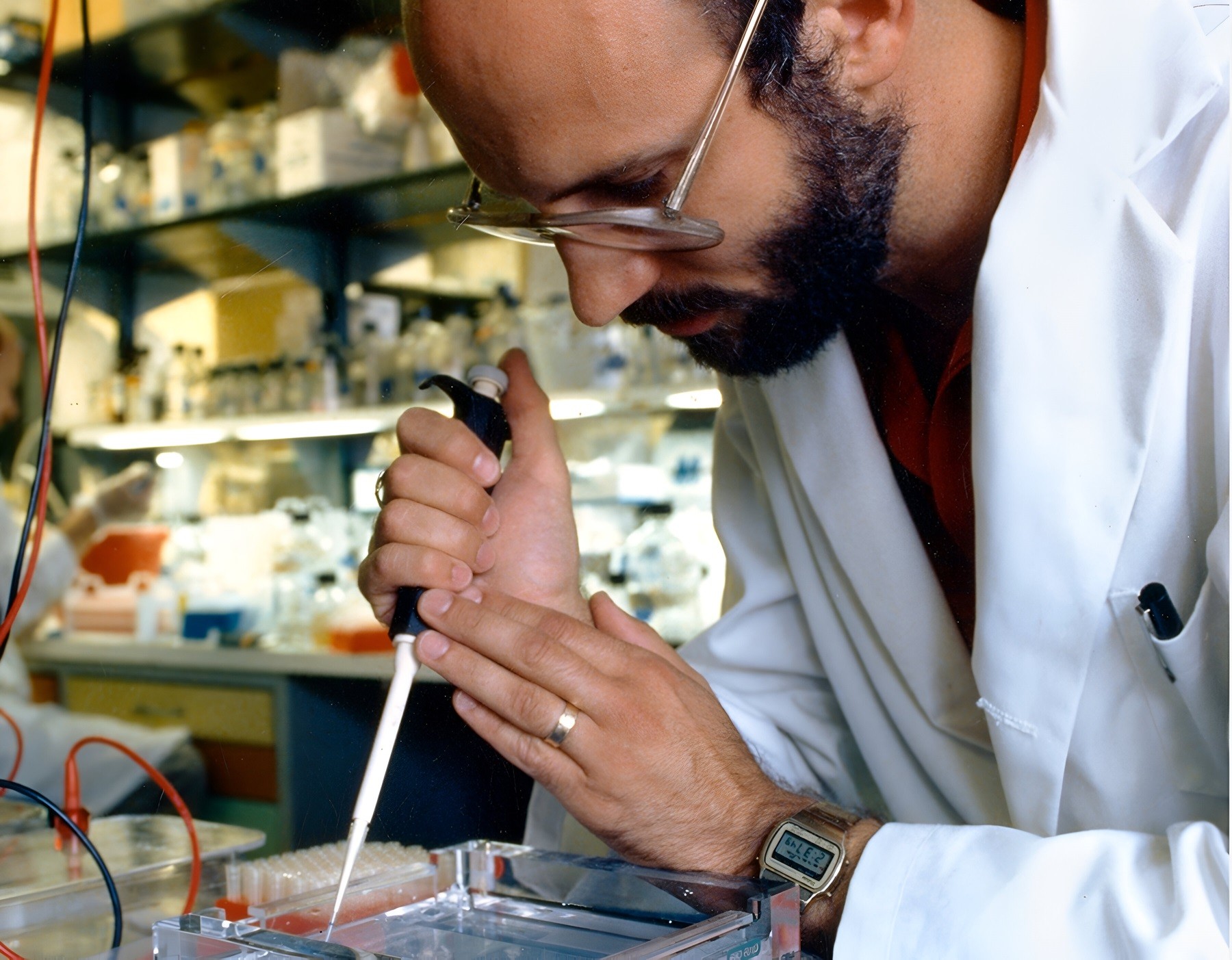
Source: National Human Genome Research Institute
The latest developments in genetic testing
On the upside, analysis technology has evolved significantly over the last few years. First, we've seen the rise of next-generation sequencing and then whole-genome sequencing, technology that can read almost all 6 billion data points of your DNA.
Nowadays, physician-ordered tests can analyze your entire genetic code and provide detailed reports on your genetic health. They're as easy to obtain and take as commercial-grade tests. While the first whole-genome sequencing endeavor cost $3 billion and took 13 years, at-home tests like Nucleus Premium are now available at affordable prices.
Nucleus can give you insights into your genetic risks, allowing you to take better ownership of your health and secure a brighter future for you and your family.
Nucleus: Extensive genetic insights at your fingertips
Nucleus is an all-in-one platform that offers physician-ordered, clinical-grade genetic screening. By using the most advanced whole-genome sequencing technology, Nucleus can analyze ~100% of your DNA, detecting even rare variants that many other tests overlook but which can have a major impact on your life. It calculates your risk scores with 99.9% accuracy.
What makes Nucleus stand out is that it considers the interplay of your genetic and non-genetic factors like age, lifestyle, and ancestry to provide tailored assessments.
From a simple swab sample, Nucleus can provide detailed but easy-to-understand reports for:
Over 170 diseases, including cancer, heart disease, and mental health conditions
Rare and/or high-effect variants, including those for rare cancers
Carrier status
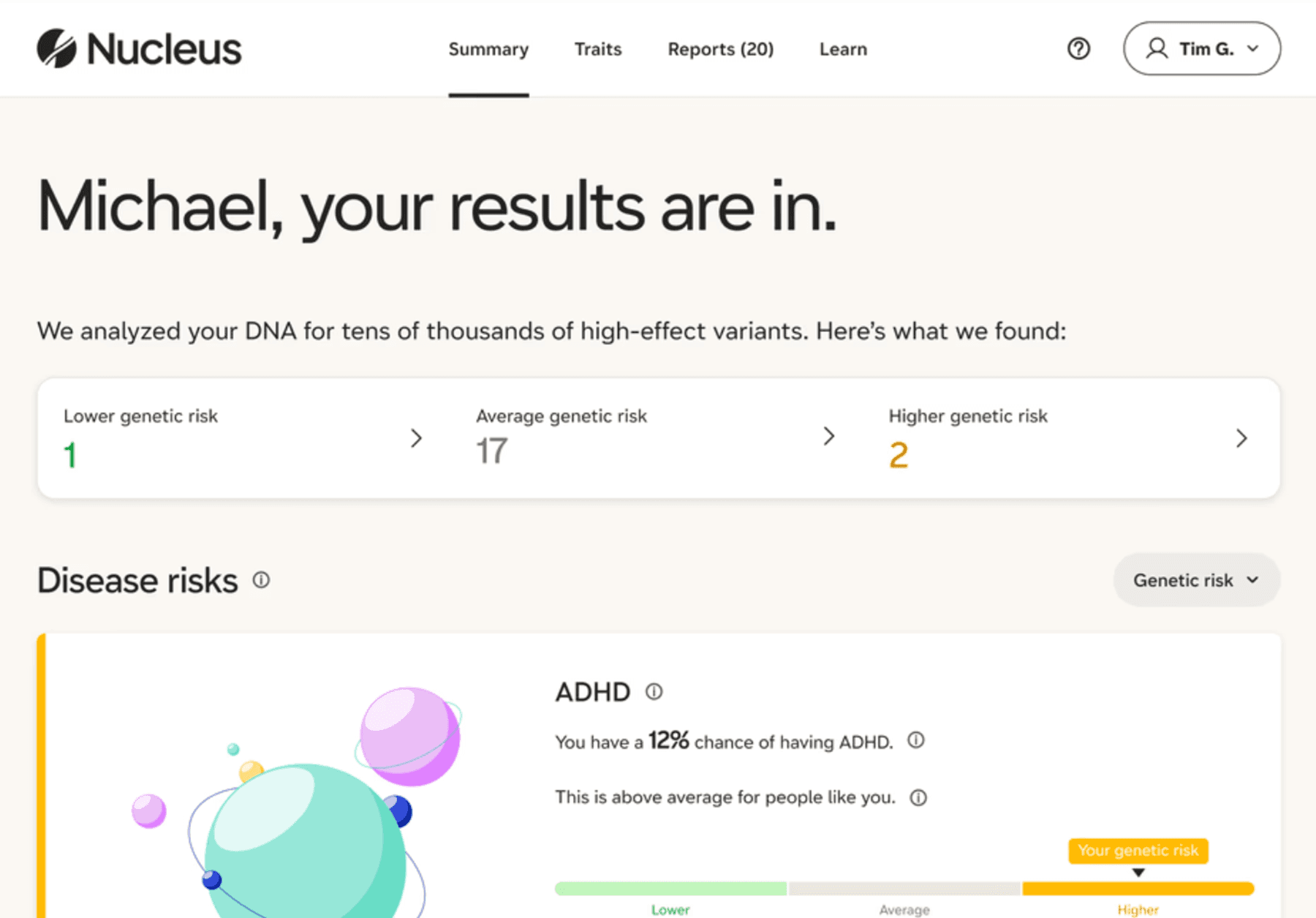
Nucleus is fully regulated, collaborating with CAP and CLIA-certified labs dedicated to ensuring quality and accuracy of analysis. The platform is also HIPAA-compliant, so you don’t need to worry about the safety or privacy of sensitive data.
Simple and affordable
While many whole-genome tests cost thousands of dollars, you can get Nucleus Premium for [PRICE.KIT_SOLO.ONE]. The package unlocks all available reports on your genetic health, risks, and traits. You can also choose to get new reports as more research comes out and your lifestyle factors change.
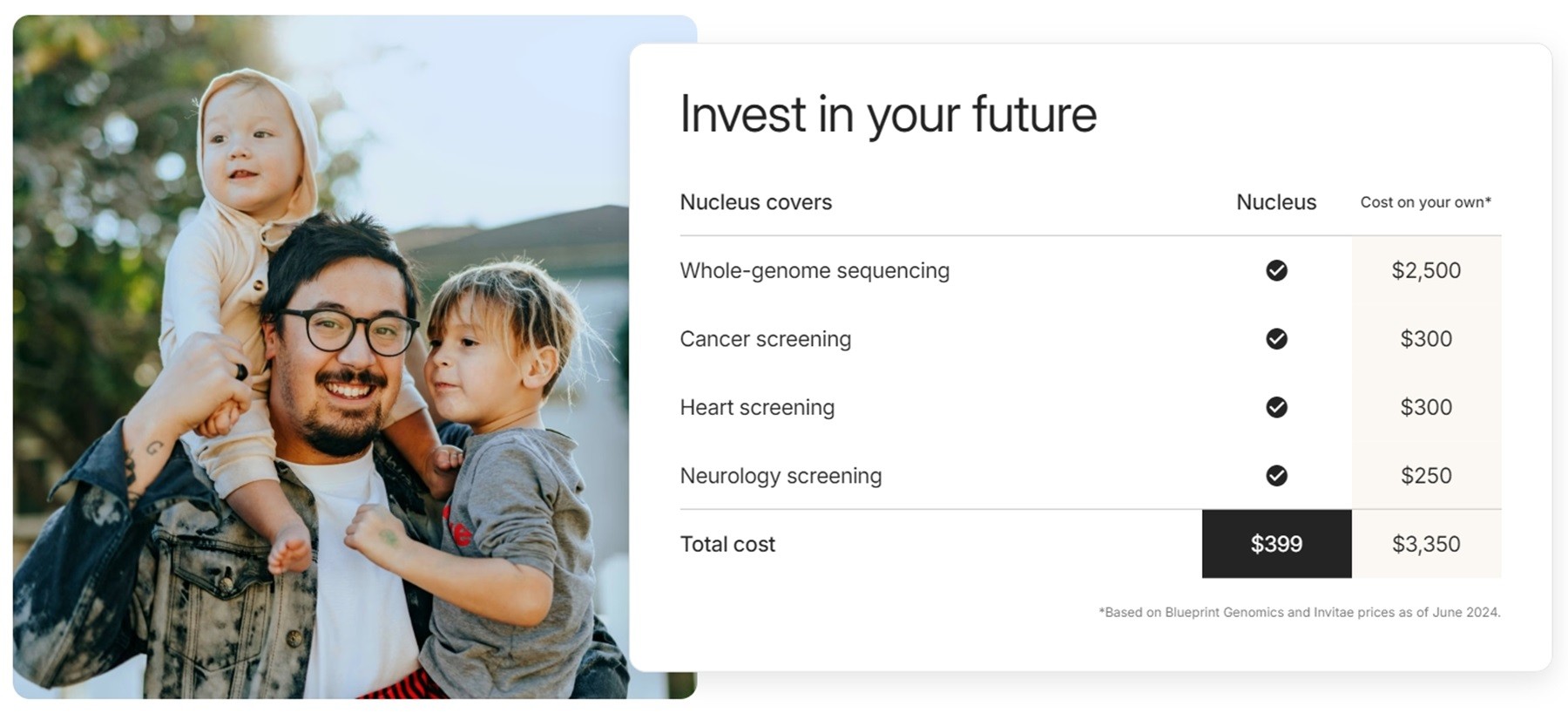
Source: Nucleus
Once the kit arrives at your home, you’ll only need to swab your cheeks and ship the sample to the lab. You can check your results in your Nucleus account within six to eight weeks.
If you have any concerns or need guidance, Nucleus can connect you with a board-certified genetic counselor from its SteadyMD partner network.
Here’s how to get started with Nucleus Premium:
Fill out personal details
Order the Nucleus Premium kit
Bonus: Nucleus is the go-to DNA platform for many genetics and longevity enthusiasts, including Bryan Johnson. He swabbed to get his Nucleus all-in-one health insights in the 2024 Don't Die Summit in San Francisco. You can watch the video here!

Featured image source: cottonbro studio












